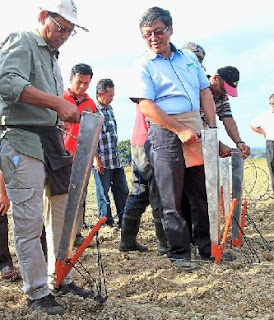7. To expand our agricultural activities and increase our agro-food production so that we can attain food sovereignty, we need to encourage more young people to go into the field. How can we do that?
We have to prove that agriculture can guarantee a good life. True, some people say they are going into agriculture because of their love of farming or nature, and they say they don’t care about the money. In the long run, however, it will not be sustainable. We need to break the old myth that farmers are poor, that there is no money in farming, and they need aid. The minute you can prove that one can have economic stability and prosperity through agriculture, you can draw young people into the field. We also need to build up “Agriculture icons” and develop “cool farmers” who are modern, adept at technology et cetera. I think more and more people are losing interest in or getting fed up of office work. They don’t want to dress formally or wear suits and be tied to their desks every day. I think many young people now aspire to work out in the open and be close to nature and dress casually in jeans and t-shirt. We need to build these images and types of personalities to change the old perception on agriculture.
8. We already have a National Agro-Food Policy 2010-2020, so how does this and food sovereignty factor into it?
Livestock is not mentioned in our National Agro-Food Policy for some reason. I’m not sure why. And while we have highlighted food security in that policy, it is not enough. We have to do more. Food sovereignty means you are more than secure, you are supreme - you have power and strength as a food producer and can penetrate other markets in the world. In some agricultural countries like Denmark, for example, they don’t talk about producing 100% or 200% of their food needs, they are actually looking at producing 700% of their needs, so that they can conquer the world markets with their food products. It’s the same in countries like Norway and Switzerland, among others. They are small countries but they are producing more food that they need because they are looking at food as a tool for supremacy and diplomacy. Even in the US, the second prominent state building in Washington is the Department of Agriculture, underlining the importance of the agro-food sector. In the US’ DoA, for example, they have about 1000 economists and other experts who understand climate change, genes, seeds - all looking at how to develop policies that will make their country stronger. We can say that we are secure now, but if there is war, we might lose our sovereignty.
Original info from local newspaper and published.
Rearranged by,
M Anem,
Senior Agronomist,
Kg Dadong,
Rearranged by,
M Anem,
Senior Agronomist,
Kg Dadong,
Kemaman,
Terengganu,
Terengganu,
Malaysia.
(Attended the official grain corn planting by Minister)
(Attended the official grain corn planting by Minister)


No comments:
Post a Comment